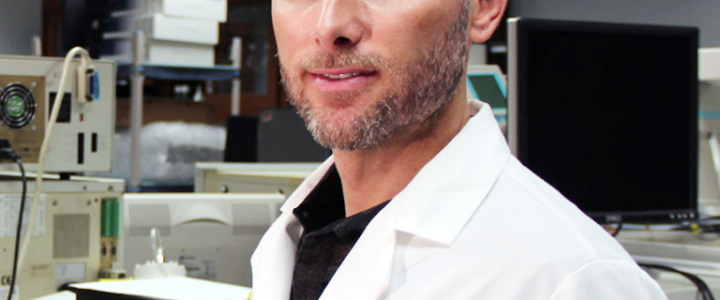FRAXA Research Foundation awarded a grant of $90,000 over two years to Clinton Canal, PhD. Dr. Canal, previously a research assistant professor at Northeastern University, has just launched his own lab at Mercer University in Atlanta, GA, to focus on Fragile X research.
Read moreautism
$75,000 Raised for Fragile X Research by Friends of FRAXA at our Fall Fling

On Thursday, September 7 over 150 friends of FRAXA joined us at the Smith Barn at the Peabody Historical Society for the second annual FRAXA Fall Fling. Together we raised over $75,000 for Fragile X research — including a hand-delivered check for $25,000! Families from as far away as Miami, Florida joined us, even with hurricane Irma approaching their home state. Unfortunately, Irma ambushed Weather Channel Storm Tracker and Fragile X parent, Jim Cantore.
Read moreDevelopment of a High-Content Synapse Assay to Screen Therapeutics for Fragile X Syndrome

With a $45,000 grant from FRAXA Research Foundation in 2009, Dr. Mark Bear and Dr. Asha Bhakar used High Content Screening (HCS) to develop an assay sensitive to the effect of the FXS genotype. This project was funded in full by NIH after the first year.
Read moreNeural Markers of Fragile X: A Powerful New Tool for Clinical Trials
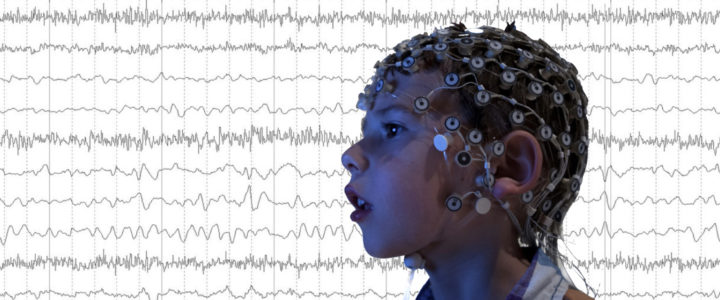
Once the neural marker is identified for a particular challenge, such as kids with poor language versus good language, neural markers can be measured during drug and behavioral therapy trials to see if a child is improving based on objective biological measures.
Read moreFragile X Awareness Day Origins and a Tribute

July 22 is National Fragile X Awareness Day, but I’ll bet few know the history behind it.
In 2000, before there was such a thing as a Fragile X Advocacy Day, FRAXA Research Foundation and David Busby (husband to Mary Beth, father to two adult sons living with Fragile X, a member of FRAXA’s pioneering leadership team, and a prominent and politically well-connected DC lawyer) were running Fragile X advocacy in Washington, DC.
Read moreMetformin, Diabetes Drug, Potential Fragile X Treatment

“We treated mice with metformin and corrected all the core Fragile X deficits. We are optimistic about using metformin in human clinical trials. This is a generic drug with few side effects” says Nahum Sonenberg, PhD, James McGill Professor, Department of Biochemistry, McGill Cancer Center, McGill University.
Read moreRepurposing Available Drugs to Treat Fragile X Syndrome – FRAXA Initiatives
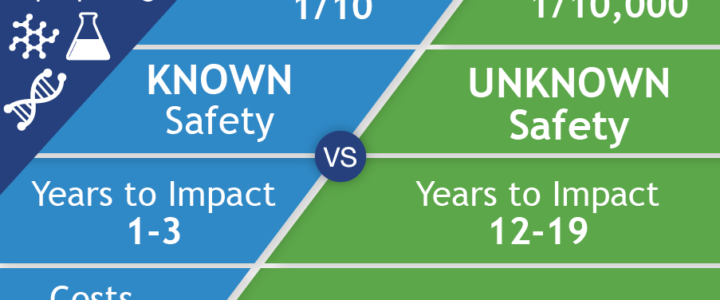
FRAXA Research Foundation was founded in 1994 to fund biomedical research aimed at finding a cure for Fragile X syndrome and, ultimately, autism. We prioritize translational research with the potential to lead to improved treatments for Fragile X in the near term. Our early efforts involved supporting a great deal of basic neuroscience to understand the cause of Fragile X. By 1996, these efforts had already begun to yield results useful for drug repurposing. To date, FRAXA has funded well over $25 million in research, with over $3 million of that for repurposing existing drugs for Fragile X.
Read moreA Kinase Assay as a Biomarker for Fragile X Syndrome
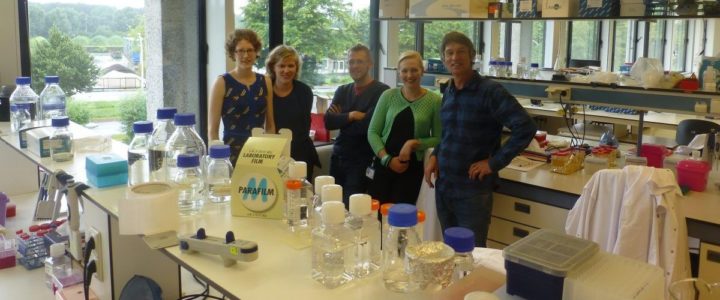
With a $90,000 grant from FRAXA Research Foundation over 2017-2018, Dr. Frank Kooy at the University of Antwerp, Belgium, is investigating whether phosphorylation abnormalities are a suitable biomarker for the Fragile X syndrome.
Read moreNIH Investigator Carolyn Beebe Smith, PhD, Looks to Improve Sleep in Fragile X Syndrome
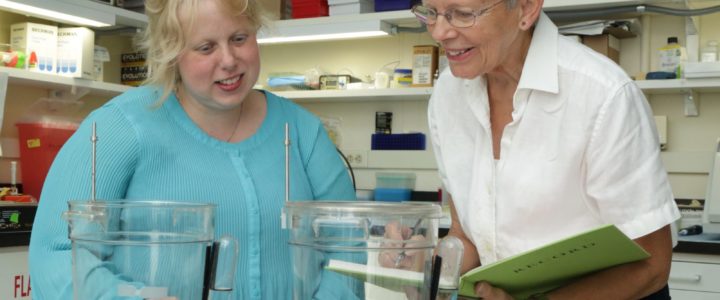
Our sons with Fragile X Syndrome typically go to bed early and rise early. Sometimes they jump on us while we are sleeping at 3 a.m., excited to start their day. For heaven’s sake, why? The answer may come from Carolyn Beebe Smith, PhD, senior investigator, Section on Neuroadaptation and Protein Metabolism, National Institute of Mental Health, National Institutes of Health, Bethesda, Maryland. She is studying why children, in particularly boys, with FXS have problems sleeping.
Read moreMark Bear’s Goal: Disease-Modifying Treatments for Fragile X

Researcher Mark Bear, PhD, Picower Professor of Neuroscience, sees success developing disease-modifying treatments for Fragile X syndrome and other developmental brain disorders. Finally, hope. And it comes from his lab, The Picower Institute for Learning and Memory, Department of Brain and Cognitive Sciences, Massachusetts Institute of Technology.
Read moreSensory Hypersensibility in Fragile X Syndrome and BK Channel Openers

With $366,100 in grants from FRAXA Research Foundation, these investigators at the University of Orleans studied sensory abnormalities in Fragile X mice and test the ability of a class of drugs, BK channel openers, to rescue these abnormalities.
Read moreKimberly Huber, PhD, Explores Hyperexcitability in Fragile X Syndrome
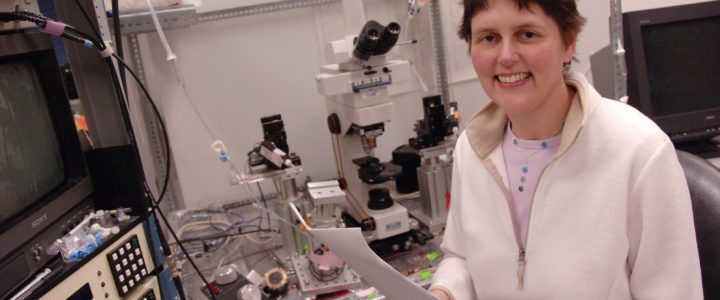
Ever wonder why your child with Fragile X suddenly screams for no apparent reason or jumps and flaps uncontrollably seemingly for hours? You got it: hyperexcitability. But what exactly causes it? And what can fix it? Kimberly Huber, PhD, is working long and hard in her lab to answer those questions. Dr. Huber, professor, Neuroscience, UT Southwestern Medical Center, is seeking to understand how FMRP regulates connections between brain cells, called synapses, and the function of brain circuits, which are several connected brain cells.
Read moreIdentifying Biomarkers for Fragile X Syndrome – A Study in Argentina
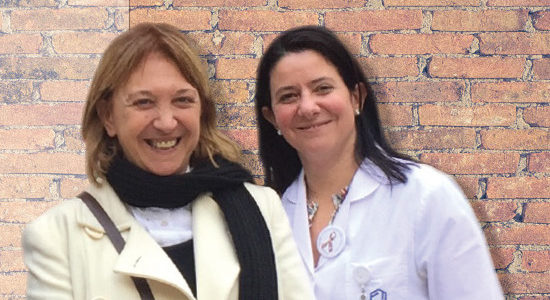
Bio·mark·er, noun, a distinctive biological or biologically derived indicator of a process, event, or condition. Doesn’t help? Well, it’s perfectly clear to Argentinian researchers Patricia Cogram, PhD, and Paulina Carullo, MD, from the FLENI Institute in Buenos Aires, Argentina. They understand there is an urgent need for validated biomarkers after recent Fragile X syndrome clinical trials have failed on their primary endpoints.
Read moreMemory Lane: New Research to Improve Memory in Fragile X Mice
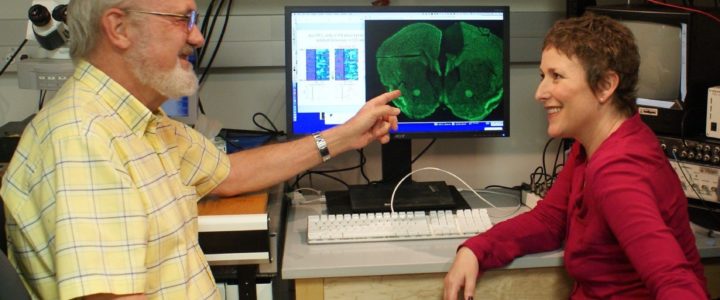
University of Texas at Austin Researchers Daniel Johnston, PhD, and Jennifer J. Siegel, PhD, explore ways to Iimprove memory in Fragile X mice.
Read moreNew compound from Anavex Improves Learning and Behavior in Fragile X Mice
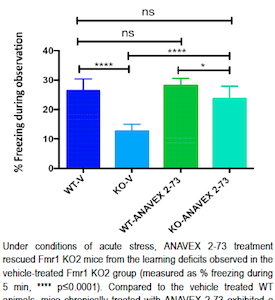
A potential new treatment for Fragile X syndrome is showing promise. While still early in development, the investigational drug was able to improve intellectual, learning and hyperactivity measures in a mouse model of Fragile X syndrome. Anavex 2-73 is a sigma-1 receptor agonist being developed for autism spectrum disorders, including Rett syndrome and Fragile X syndrome, and for Alzheimer’s disease. Anavex Life Sciences presented the data at the Gordon Research Conference for Fragile X and Autism-Related Disorders, held June 5-10, 2016 in Mount Snow, VT. The study was sponsored by FRAXA, via the FRAXA Drug Validation Initiative, and performed by Fraunhofer Chile Research, in Santiago, Chile.
Read moreDouble Down: Fragile X Clinical Trial Combines Two Available Drugs
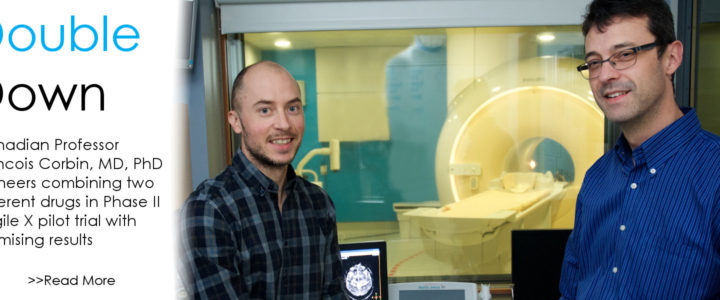
If all the science world’s a stage, Fragile X researchers are more than merely players. They are center stage. So believes Francois Corbin, MD, PhD, professor, Université de Sherbrooke, Canada, who directs the university’s Fragile X Clinic. Corbin, who has received more than $100,000 in FRAXA support since 2012, is leading a pilot randomized Phase II trial, exploring the tolerability and the synergistic effect of a combined therapy.
Read moreFragile X Fruit Fly Research Bears Fruit

A new FRAXA-funded study shows how the hormone insulin – usually associated with diabetes — is involved in the daily activity patterns and learning deficits in the fruit fly model of Fragile X Syndrome (FXS). The study also reveal a metabolic pathway that can be targeted by new and already approved drugs to treat Fragile X patients, notably metformin.
Read moreAbnormalities of Synaptic Plasticity in the Fragile X Amygdala

With a $110,050 grant from FRAXA Research Foundation from 2005-2016, Dr. Sumantra Chattarji at the National Center for Biological Sciences researched how the amygdala is affected by Fragile X syndrome. Results published.
Read moreCrossroads of Fragile X and Alzheimers Research

Last week researchers at VIB Leuven in Belgium published evidence that a brain pathway involving the protein APP (Amyloid Precursor Protein) plays a vital role in development of Fragile X syndrome, one of the most common causes of autism. Scientists led by Dr. Emanuela Pasciuto in the laboratory of Prof Claudia Bagni published findings of their study in the journal Neuron.
Read moreBoston Bruins Grant Funds New Fragile X Research

Bruins Foundation Executive Director Bob Sweeney pledging a $90,000 donation to FRAXA Research today at Shared Living Collaborative’s Gateway Farm in Merrimac, MA. The award will enable the organization to fund an entirely new research project aimed at developing new treatments for Fragile X, a genetic syndrome that is the most common inherited cause of autism.
Read moreFragile X Programs at UMASS – University of MA, Worcester

Fragile X Syndrome Behavioral Health Clinic The Center for Autism and Neurodevelopmental Disorders (CANDO) is opening a specialty clinic for individuals with Fragile X Syndrome (under the direction of Dr. Jean Frazier) to evaluate and provide treatment for behavioral challenges.
Read moreThe Endocannabinoid System in a Mouse Model of Fragile X Syndrome

With a $128,500 grant over 2011-2013 from FRAXA Research Foundation, Drs. Bradley Alger and Ai-Hui Tang at the University of Maryland researched endocannabinoid pathways in Fragile X.
Read moreInhibitors of STEP as a Novel Treatment of Fragile X Syndrome

With a $349,000 grant from FRAXA Research Foundation from 2008-2015, Dr. Paul Lombroso and his team at Yale University researched if inhibiting STEP could reduce behavioral abnormalities in Fragile X syndrome. Results published.
Read moreBcl-xL Inhibition as a Therapeutic Strategy for Fragile X Syndrome

Scientists have found increases in the numbers of neurons in brain regions of autistic children, suggesting a problem in developmental programmed cell death pathways. One of the most important effectors of neuronal survival during brain development is the “anti-cell death” protein Bcl-xL. While the normal function of Bcl-xL is to maintain a healthy number of neurons and synapses, over-expressed Bcl-xL can cause an overabundance of synaptic connections. This may be happening in Fragile X.
Read moreSeizures in Fragile X Syndrome and Therapeutic Potential of NMDA Receptor Antagonists

With a $90,000 grant from the FRAXA Research Foundation, Dr. Robert Wong is investigating how seizures are generated in Fragile X neurons. More generally, he is looking at how synapses are modified to enable learning and memory and how this process is impaired in Fragile X.
Read more
